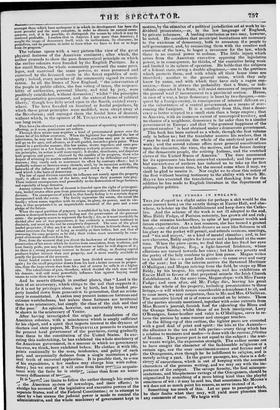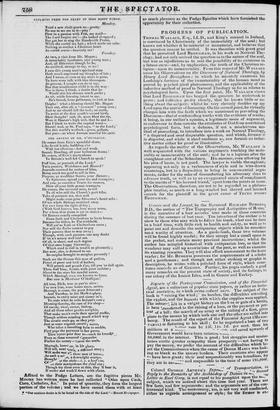THE FUDGES IN ENGLAND.
THIS jeu desprit is a slight satire (or perhaps a skit would be the more correct term) on the saintly doings at Exeter Hall, and else
where, to bolster up the Establishment and keep down the Catho lics. And the scheme of the work is not ill adapted to the end. Miss Biddy Fudge, of Parisian notoriety, has grown old and rich; but she remains husbandless, in spite of her present wealth and future expectancies. As a last resource, she has turned a genteel Saint,—one of that class which dresses as near like Solomon in all
his glory as the pocket will permit, and attends sermons, meetings, and "tea and prayer," as a kind of mental stimulus ; and, in her new character, Biddy angles for heaven and a husband at the same time. When the piece opens, we find that she has fixed her eyes upon Patrick Megan, Esq., a light-hearted Irishman, whose affections are turned towards her niece; but his own poverty and the poetry of the lady combine to give him pause. Megan writes to a friend of his— a poor Irish curate— to come over and carry off the aunt ; but in the interim arrives the Reverend Mortimer °Mulligan ; and Mogan retiring from the field, he snaps up Miss Biddy, by his brogue, his outpourings, and his exhibitions at Exeter Hall in favour of that perpetual miracle the Irish Church Establishment. At the same time, Megan elope: with Miss Fanny Fudge; and soon after, old Mr. Fudge dies, leaving his great niece the whole of his property, including presentations to three livings,—a will which causes considerable astonishment to all, and to none more, we may conjecture, than to Mr. and Mrs. O'Sullivan. The narrative hinted at is of course carried on by letters. Those of the parties already mentioned, together with some extracts from Miss BIDDY'S journal, furnish food for iidiculing the Blues and the Orange Saints; whilst those of an Irish immigrant, Larry OTranigan, foster-brother and valet to °Mulligan, serve to relieve the picture by some coarser and stronger touches. In the filling-up of this outline, the lighter parts are executed with a good deal of point and spirit : the hits at the Annuals— the allusions to the tea and talk parties—every thing which has a relation to manners and modes—is done with the euriosa felicitag of MOORE. The graver part is not equal to the subject : the matter wants weight, the expression strength. The author seems not to have caught the character of the fashionable retigieuse of a certain age, nor the sour sanctimoniousness and furious zeal of. the Orangeman, even though he be indifferent to religion, and is merely acting a part. In the graver passages, too, there is a deficiency of earnestness, which is out of keeping with the assumed characters of the persons writing, and we may say with the importance of the subject. The savage ferocity, the foul misrepresentations, and blasphemous ravings of the Orangemen, should be stigmatized by something of a more biting kind than the playful smartness of wit : it may be said too, that sometimes Mr. MOORE S wit does not so much point his reason, as serve instead of it. Something too much of this. Let us pass to passages which, be their faults what they may, will yield more pleasure that any comments of ours. We begin with
BATSA,CTS FEQM TUE LIAM( OF MISS BIDDY FUNIT.,
Monday.
Tried a new chide gown on—pretty. No one to see ate in it—city!
Flew in a passion with kris, my maid— The Lord forgive me !—she looked dkusayed ; But hot her to sing the Hundredth Psalm, While she curled my hair ; which made rue calm.
Nothing so soothes a Christian heart As sacred music—heavenly art !
Tuesday.
At two, a visit from Mr. Magan;
A remarkably handsome, nice young mau; And, all Hibernian though he be,
As civilized, strange to say, as we !
I own this young man's spiritual state Hath much engrossed my thoughts of late; And I mean, as soon as my niece is gone, To have some talk with him thereupon. At present, I nought can do or say, But that troublesome child is in the way : Nor is there, I think, a doubt that he Would also her absence much prefer ; As oft, while listening intent to me, lie's forced, from politeness, to look at her. Ileigho ! what a blessing should Mr. Megan Turn out, after all, a " seemed " young man; And to we should fall the task, on earth, To assist at the dear youth's second birth. Blest thought ! and, all, more blest the tie, Were it Heaven's high will, that he and 1— But I blush to write the nuptial word— Should wed, as St. Paul says, " in the Lord ;" Not this world's wedlock—gross, gallant, But pure—as when Aniratu married his aunt.
THE ADvENT OF SIR. &MULLIGAN.
Ile comes from Erin's speechful shore, Like fervid kettle, bubbling o'er With hot effusions—hot and weak. Sound, Humbug, all your bollowest drums ! Ile comes, of Erin's martyrdoms To Britain's well-fed Church to speak !
Puff him, ye journals of the Lord,*
Twin prosers, Watchman and Record!
Journals reserved for realms of bliss, Being much too good to sell in this. Prepare, ye wealthier Saints, your dinners ; Ye Spinsters, spread your tea and crumpets; And you, ye countless Tracts for sinnets, Blow all your little penny-trumpets. He comes, the reverend man, to tell To all who still the Church's part take, Tales of parsonic wo, that well Might make even grim Dissenter's heart ache : Of ten whole Bishops snatched away For ever from the light of day ; (With God knows, too, how many more,
For whom that doom is yet in store)—
Of Rectors cruelly compelled From Bath and Cheltenham to haste home, Because the tithes, by Pat withheld, Will not to Bath or Cheltenham come; Nor will the Rocks consent to pay Their parsons thus to stay away ; Though, with such parsons, one may doubt If 'tis n't money well laid out. Of all, in short, and each degree Of that once happy Hierarchy, Which used to roll in wealth so pleasantly ; But now, alas, is doomed to see Its surplus brought to nonplus presently !
Such are the themes this man of pathos, Priest of prose and lord of bathos, Will preach and preach t'ye, till you 're dull again. 'Then, hail him, Saints, with joint acclaim ; Shout to the stars his tuneful name,
Which Murtagh was, -ere known to fame, But now is Mortimer O'Mulligan
All true, Dick, true as you're alive: I've seen him, some hours since, arrive.
Murtagh is come, the great itinerant; And Tuesday, in the Market-place, Intends, to every saint and sinner in't, To state what he calls Ireland's case ;
Meaning thereby, the case of his Shop—
Of curate, vicar, rector, bishop, And all those other grades seraphic, That make men's souls their special traffic,
Though seldom minding much which way The erratic souls go, so they pay.
Just as some roguish countrsi nurse,
Who takes a foundling babe to suckle, First pops the payment in her purse,
Then leaves poor dear to—suck its knuckl's
Even so these reverend r4maroles
Pocket the money—sSarve the souls, Murtagh, howesses, in his Owl, Will tell, next '4:seek,
a different story;
As each a as. s '1 these men of barter, Boon he ' sit, a downright martyr, • , so the stake—i. e. a beef cue,, Of sir their martyrdoms the chief one;
Though try them even at this, they 'II bear it, If tender and wash'd down with claret.
Affixed to the Fudge Letters, are the fugitive pieces Mr. MOORE has written since he last collected "Odes upon Cash, Corn, Catholics, &c." In point of quantity, they form the largest portion of the volume; and we have reread them with at least
"Our anxious desire is to be found on the side of the Lord."—Record Newspaper.
as much pleasure as the Fudge Epistles which have furnished the opportunity for their collection.



























 Previous page
Previous page